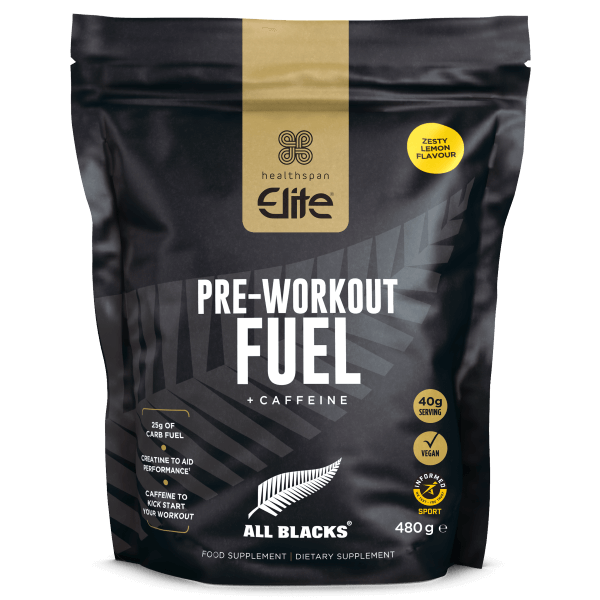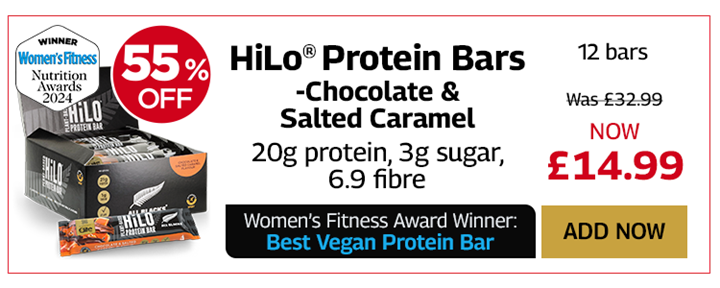Pre-workout supplements contain a mixture of ingredients including carbohydrates, creatine, caffeine and other amino acids such as beta-alanine, and can help your body with its energy requirements in competition and high-intensity training. Nutritionist Rob Hobson explains.
The role of supplements in exercise
Athletes are always looking for ways to improve their capacity to train to the best of their ability. Diet plays a key role, as it helps to maintain energy levels and support recovery, while also being involved in many other essential functions relevant to athletes, such as immunity and bone health.
Supplements do as the name suggests, and help to bridge any gaps in the diet. These gaps may occur when someone's diet is not very well balanced or when the body's demand for a nutrient is greater than a person's intake. Athletes may find vitamin and mineral supplements useful; those most likely to impact performance are vitamin D and iron, as low levels may lead to an increased risk of upper respiratory tract infections and fatigue.
Pre-workout supplements (pre-workouts) tend to contain ingredients other than vitamins and minerals to, according to Kat Darry, nutritionist for the All Blacks, "enhance the energy output required for each high-intensity training session." Common ingredients of pre-workout supplements include glucose, fructose, creatine, caffeine, beta-alanine, branched-chain amino acids and nitrates.
Should different athletes use different pre-workout formulations depending on how they're training?
When considering a pre-workout supplement, it's first worth considering whether your goal is strength, power or endurance. It's also worth doing your research to help you choose something relevant to your sport; this will increase the chances of the supplements being effective, as for many of these formulations the research is not conclusive as to performance outcomes.
It's also important to check the batch number of any supplement you are considering with Informed Sport to avoid substances banned for competing athletes.
Should athletes use pre-workouts when competing as well as when training?
Pre-workout supplements can be used to help during training, and can be particularly relevant in specific situations; caffeine can help to overcome jetlag when travelling overseas, and carbohydrate when you have multiple intense training sessions during a single day or on consecutive days.
According to Kat Darry, the All Blacks use pre-workouts "for both high-intensity training sessions and matches." Pre-workout supplements may also be beneficial for other competitive sports, alongside carbohydrate gels for endurance events or creatine for those competing in 100m sprint, weightlifting or sports of intermittent high intensity such as football or rugby.
Are there certain athletes who shouldn't use pre-workout supplements?
Pre-workout supplements have to be approved safe for consumption before they can be sold, but that doesn't mean they are risk-free for all athletes.
Their effectiveness is also unique to the individual; according to Kat Darry, "as with anything there is always an individual approach, and the same goes for supplementation. For some athletes a pre-workout won't enhance their performance as we might expect. There can be circumstances where pre-workout results in water retention and weight gain, which may not be the desired outcome for some individual athletes' performance."
Artificial sweeteners are commonly used in pre-workout supplements, and although these are perfectly safe, certain types such as sorbitol or xylitol (sugar alcohols) can trigger symptoms such as gas, bloating and diarrhoea, especially when consumed to excess.
Caffeine is a useful supplement to overcome fatigue and improve mental alertness, but it can also lead to increased anxiety and jitteriness, especially in athletes who are sensitive to its effects. Creatine can cause water retention, resulting in weight gain, which may be detrimental to endurance athletes as increased weight means an increase in energy requirements.
As with any supplement, it is important for athletes to trial different brands, as some may be better tolerated than others. This is especially important when considering a supplement to use during competition.
"The key ingredients I want in a pre-workout supplement are carbohydrates, creatine, and beta-alanine, as all these contribute towards enhanced training outputs, adaptation and recovery."
Kat Darry, All Blacks Nutritionist
What ingredients should you look for in a pre-workout supplement?
Pre-workout supplements can contain a multitude of ingredients, but some are more favoured than others. According to Kat Darry, "the key ingredients I want in a pre-workout supplement are carbohydrates, creatine, and beta-alanine, as all these contribute towards enhanced training outputs, adaptation and recovery."
Caffeine
Caffeine can be a useful component of a pre-workout supplement. According to the International Society of Sports Nutrition (ISSN), caffeine has many positive uses.1 Caffeine appears to enhance various aspects of exercise such as strength, sprinting, jumping and throwing. The greatest moderate-to-large benefits seem to come in endurance sport.
Caffeine also appears to improve physical performance in both trained and untrained individuals, and has been shown to provide performance benefits in cognitive function (mental alertness). Caffeine may also help to improve performance in some people when sleep-deprived.

Find out more about how caffeine can support athletic performance.
Carbohydrates
Carbohydrates are essential for all athletes, as they supply the body with glucose, the body's main energy source, which is stored in the body as glycogen. Maintaining a good intake of carbohydrates during and after training ensures enough glycogen and helps maintain energy levels, especially when training multiple times during the day or on consecutive days.
Endurance athletes and those involved in intermittent sports (football, rugby) are particularly reliant on carbohydrates, given the aerobic intensity of training sessions.
Supplements such as sports drinks and energy gels containing a blend of glucose and fructose can help athletes to restore glycogen levels, and these are particularly beneficial for endurance athletes during competition, when it is impractical to eat solid food.

Find out more about energy gels as a convenient source of carbohydrates.
Creatine
Creatine is primarily stored in skeletal muscle as phosphocreatine (PCr), which plays a role in powering exercise and movement.2 Muscle cells require energy in the form of ATP, which is broken down as muscles contract.
Although carbohydrates and fats can be used to make ATP, this is a relatively slow process. Phosphocreatine provides a quick source of energy, allowing the rapid restoration of ATP essential for fuelling high-intensity exercise. Creatine exists in small amounts in the body, which is enough to fuel about 10 seconds of high-intensity exercise, but supplementing has been shown to increase this amount of available creatine by up to 30%.3
Creatine supplements are useful in power and strength sports, and have been shown to increase muscle mass and strength during resistance training while improving performance in competition.2 This supplement has also been shown to improve measurable performance such as sprint speed and jump height, benefiting those involved in intermittent (team) sports such as football, rugby or basketball.4

Find out more about creatine and how it's used in sport.
Beta-alanine
Beta-alanine is an amino acid that binds with histidine to make carnosine, which is then stored in skeletal muscle.
During high-intensity exercise, lactic acid is produced. This is then broken down into lactate and hydrogen ions, which lower the PH level in muscles and reduce their ability to contract, which can impact performance.
Carnosine acts as a buffer to help deal with this change in PH by neutralising hydrogen ions. Supplementing with beta-alanine over time can increase muscle carnosine levels, and may help to improve performance in both continuous and intermittent exercise lasting 30 seconds to 10 minutes, including repeated high-intensity work such as sprints.5, 6

Find out more about the practical benefits of beta-alanine for athletes.
Should I use a pre-workout supplement with caffeine?
Caffeine can be useful to overcome fatigue and increase mental awareness. However, athletes need to gauge their tolerance to caffeine to avoid any unwanted side effects.
Aside from the obvious side effects of increased anxiety or jitteriness, athletes should also consider their sleep pattern. Sleep is essential for the recovery and adaptive processes needed between bouts of exercise, and has been associated with improved performance, competitive success and reduced risk of injury and illness.7
If athletes are unsure as to whether they should use a pre-workout containing caffeine, it's better to err on the side of caution; according to Kat Darry, "some athletes don't tolerate caffeine well, and caffeine can be easily outsourced [using supplements] such as caffeine gum for those that require it."
Pre-workout supplements have their place and can be useful for athletes during bouts of high-intensity exercise and competition, but they are not a panacea for performance. Athletes should consider their particular sporting goals when choosing pre-workouts, and should always trial their chosen supplements before using them in competition.

Elite All Blacks Pre-Workout Fuel + Caffeine
Lemon-flavoured pre-workout blend with creatine, fast-release carbs and caffeine to kick-start your workout
- 26g maltodextrin carbohydrate per serving
- Added creatine to increase physical performance
- 150mg caffeine per serving









